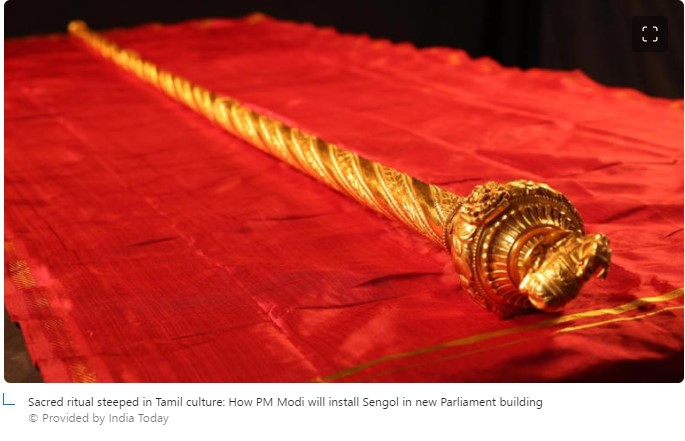Sacred ritual steeped in Tamil culture: How PM Modi will install Sengol in new Parliament building

Prime Minister Narendra Modi will install Sengol, a symbol of Indian independence, in the new Parliament building next to the Lok Sabha Speaker’s seat in a historic event on May 28.
Sengol, made in Tamil Nadu, was handed over to the country’s first Prime Minister, Jawaharlal Nehru, to mark the transfer of power from the British to Indians in 1947.
Sengol is a golden sceptre adorned with a ‘nandi’ (bull) on top, and it holds immense historical significance as it was presented to Jawaharlal Nehru by Lord Mountbatten on the eve of India’s independence.
On May 28, during the inauguration of the new Parliament building, the Sengol will be ceremoniously transported to the new Parliament building in a grand procession. Sources told India Today that the occasion will be steeped in Tamil tradition.
Leading the procession will be a group of musicians playing the Nadaswaram, a classical instrument from Tamil Nadu. Prime Minister Narendra Modi is expected to walk alongside these musicians, embracing the essence of the Tamil culture.
Additionally, ‘Adheenams’ or priests from Shaivite mutts in Tamil Nadu will be present in the well of the Lok Sabha. Upon reaching the Well, PM Modi will greet the priests, who will then purify the Sengol with holy water.
In the background, ‘Oduvars’ or Tamil temple singers will melodiously render the ‘Kolaru Padhigam’ while the Nadaswaram group chant their soulful tunes.
Following this sacred ritual, the Sengol will be handed over to PM Modi, who will install the historic sceptre within a glass case next to the Speaker’s seat in the new Parliament building. The symbolic act will signify the dawning of a new era in India’s democratic history.







